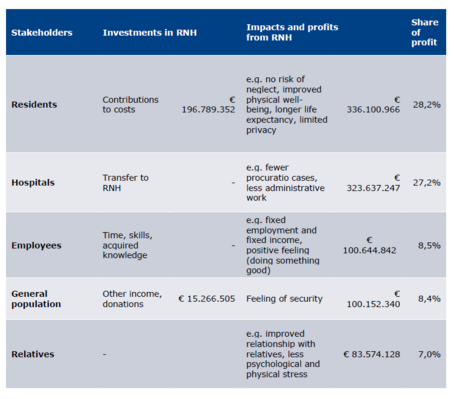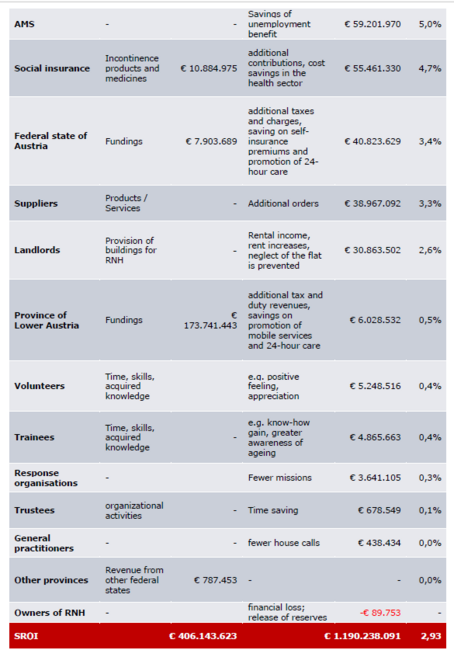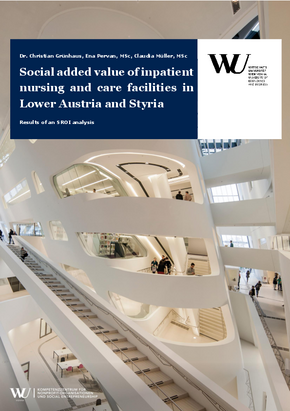SROI analysis of inpatient care facilities in Lower Austria and Styria
The NPO & SE Competence Center was commissioned by the Federal Association of Nursing and Care Homes in Austria to analyse the social and economic impacts of inpatient nursing and care facilities in Lower Austria and Styria. The observation period refers to the year 2013.
The evaluation was carried out by means of an SROI analysis, the aim of which is to record and evaluate the social added value created by the inpatient nursing and care facilities as comprehensively as possible.
In 2021, the study report was translated into English and slightly abbreviated in this process. While all findings of Lower Austria are presented in detail, the findings of Styria have been summarized.
The identification of the most important stakeholders is an essential point. For each stakeholder group, the input invested is compared with the output achieved and the outcome (impacts) in an impact chain. The identified impacts are verified, supplemented, quantified and finally, as far as possible and reasonable, evaluated in monetary units. Thus, the monetary value of the aggregated impacts can be compared to the total input available in monetary units.
As an alternative scenario, it is assumed that there are no inpatient nursing and care facilities in Lower Austria or Styria. The residents would have to be accommodated in other care settings, as far as capacities are available. These would be mobile nursing and care services, assisted living, 24-hour care, nursing homes in neighbouring provinces, hospitals or purchase of services on the market. Since not all residents could be accommodated elsewhere, caring relatives would also have to take on an increased nursing and care effort and/or there would be neglect or an earlier death among the residents.
The study shows the diverse tasks and activities of inpatient nursing and care facilities in Lower Austria and Styria. Above all, it identifies impacts for different groups that are in contact with the inpatient nursing and care facilities. The following groups were identified as stakeholders: Residents, relatives, staff, volunteers, hospitals, the federal government, the provinces of Lower Austria and Styria, other provinces, social insurance institutions, Austria's employement office AMS, suppliers, general practictioners, owners, emergency organisations, trainees, landlords, trustees and the general population.
Results
On the basis of the surveys and calculations carried out here, the total monetised impacts for 2013 amount to approximately 1,190 million euros for Lower Austria and 1,354 million euros for Styria. This compares to investments of around 406 million euros for Lower Austria and 459 million euros for Styria.
By comparing the total investments from 2013 to the sum of the monetised impacts, an SROI value of 2.93 results for Lower Austria. The SROI value for Styria is 2.95 euros. This means that every euro invested creates impacts with a monetised equivalent value of 2.93 euros for Lower Austria and 2.95 euros for Styria. The investments are thus returned threefold as positive impacts on society as a whole. The most significant positive impacts arise for the residents, followed by the hospitals. Both stakeholders together account for about 50% of the total impacts. In summary, it becomes clear that the inpatient nursing and care facilities in both provinces are very effective. The monetised impacts of the organisations, related to the year 2013, were about 2.9 times higher than the financial investments made for Lower Austria and Styria. The following tables present an overall view of the investments and profits (monetised impacts) of the inpatient nursing and care facilities in Lower Austria and Styria for the year 2013: Investments and Profits of Inpatient Nursing and Care Facilities - Overall View Lower Austria:


Presseberichte:
ORF: Pflege bringt wirtschaftlichen Mehrwert von 29.06.2015
diepresse.com: Geld für Pflege kommt dreifach retour von 29.06.2015
Standlandzeitung: Evaluierung des gesellschaftlichen Mehrwertes von Pflegeheimen von 29.06.2015
dbd Nachrichten: Evaluierung des gesellschaftlichen Mehrwertes von Pflegeheimen von 29.06.2015
APA OTS: Evaluierung des gesellschaftlichen Mehrwertes von Pflegeheimen von 29.06.2015

